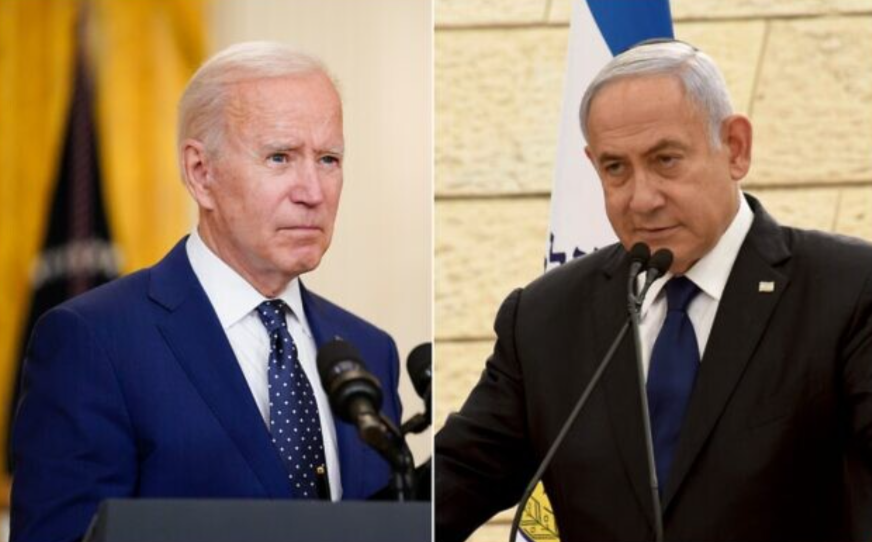Biden, Netanyahu heading for a collision on postwar vision
There exist deep divisions between the US and "Israel" on what should happen in Gaza in the short and long term once "Israel" ends its bloody aggression on the Strip.
-

US President Joe Biden in the White House on April 15, 2021, and Israeli Prime Minister Benjamin Netanyahu speaks in occupied al-Quds on April 13, 2021. (AP)
Following Operation Al-Aqsa Flood on October 7, Israeli Prime Minister Benjamin Netanyahu approached President Biden and suggested he persuade Egypt's President to open his country's borders and accept a large number of the more than 2 million Palestinians set to be forcibly displaced from Gaza.
Biden, at the time, believed it was extremely hard, considering that Egypt had been clear that it would not play a role in the displacement of Palestinians, only to adopt a more decisive position later, saying the US "under no circumstances" will permit forced displacement of Palestinians.
Many Israeli officials continue to support the proposal, which has not previously been revealed, highlighting the deep divisions between the US and "Israel" on what should happen in Gaza in the short and long term once "Israel" ends its bloody aggression on the Strip.
While the Biden administration aims to limit the war to Gaza and halt the intense bombardment there, some Israeli officials are pushing to target Hezbollah in Lebanon next, a move that US officials have fought to prevent for weeks.
Furthermore, US and Israeli authorities differ on how severely to punish violent Israeli settlers in the West Bank.
Biden and Netanyahu disagree on practically every significant issue that will become essential when the war ends, something analysts attribute to their differing domestic politics.
Following October 7, Israeli voters shifted drastically to the right, while Netanyahu's support ratings plunged, forcing the Prime Minister to embrace the extreme right as a means of political survival.
Biden, meanwhile, has been under increasing pressure from his Democratic base to stand up to "Israel" and take meaningful actions to end the bloodshed.
The latest poll by The New York Times/Siena College revealed that almost 75% of a sample of young voters aged 18 to 29 do not approve of how US President Joe Biden is handling the war on Gaza. The same believe "Israel" isn't putting in the effort to prevent civilian deaths in Gaza, and 44% state that "Israel" needs to end the war even if Hamas is not defeated, while 39% said it should go on.
According to diplomats, Netanyahu's state of mind is mirrored in his push to persuade Egypt to accept hundreds of thousands of displaced Palestinians.
A senior official revealed that Netanyahu has not only pressured Biden to persuade Egypt to accept Palestinians but has also asked the same of British Prime Minister Rishi Sunak and French President Emmanuel Macron during their trips to "Israel", something they both refused.
'Israel', US divide bursts into the open as Biden rebukes Netanyahu
Tensions between "Israel" and its closest ally, the United States, showed signs of rising last week as President Joe Biden publicly expressed concern that "Israel's" indiscriminate bombing in Gaza was eroding international support, Eric Nagourney and Gaya Gupta wrote for The New York Times.
With the civilian toll rising in Gaza, Biden warned in a Washington address that the world was turning against "Israel", urging changes within Prime Minister Benjamin Netanyahu's government.
The traditionally staunch support from the US for "Israel" appeared to soften, marking a notable departure from previous rhetoric, perceived by the NYT's article, despite no changes in US-made weapons and bombs delivery to the Israelis.
According to the writers, Biden's remarks represented a significant break in language since the war on Gaza began.
On Tuesday, Israeli media quoted Avigdor Lieberman, chairman of the Yisrael Beiteinu party, in what it called "harsh" claims of Netanyahu using the war in Gaza as a means to stay in power.
In detail, Israeli media reported that "Lieberman continues to attack Netanyahu, claiming that the continuation of the war serves him politically."
In an interview for Israeli radio Reshet Bet, Lieberman said, "There is a turbulent war cabinet here that does not understand what it [the war] leads to," adding that "the Yom Kippur war lasted 19 days, and here we are fighting for 74 days and still in the process of assimilation in the north, and we cannot ignore Ansar Allah as well."
It was after this statement that Lieberman accused Netanyahu of using the war to assimilate political power.

 4 Min Read
4 Min Read








